Baghdad’s commercial hub feels pinch as Iraq protests continue
Demonstrators have replaced shoppers in markets near Tahrir Square, the heart of the capital’s uprising.
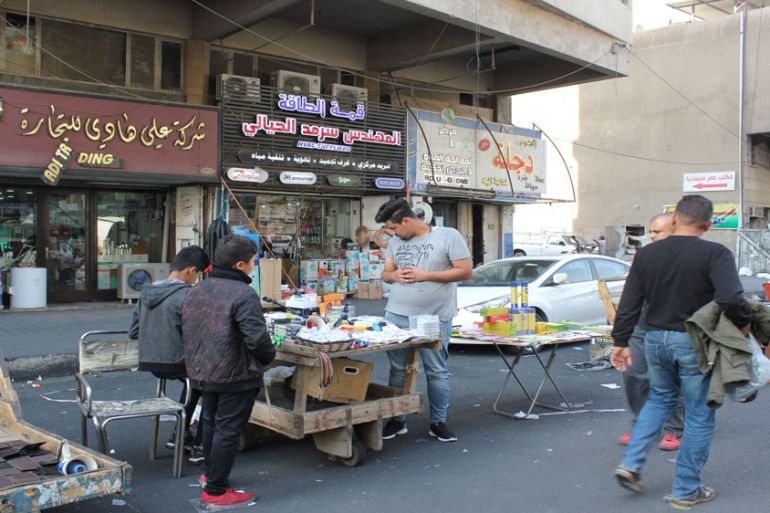
Baghdad, Iraq – On a typical day, Sinak market bustles with shoppers hunting for bargains and traders selling anything from electronic goods to water coolers.
Located at the heart of Baghdad’s commercial hub, the market stretches parallel to the river Tigris from Ahrar bridge to Sinak bridge and beyond, ending where the famous wholesale Shorja market begins.
Keep reading
list of 3 itemsDespite threats, Iraq’s medical volunteers keep protests alive
Iraqi women protesting for a better future
But since early October, when anti-government demonstrations erupted across much of Iraq, shoppers have been replaced with protesters as the nearby bridges, which separate the commercial area from the heavily fortified green zone where government buildings and foreign embassies are located, became part of the front line of the protests.
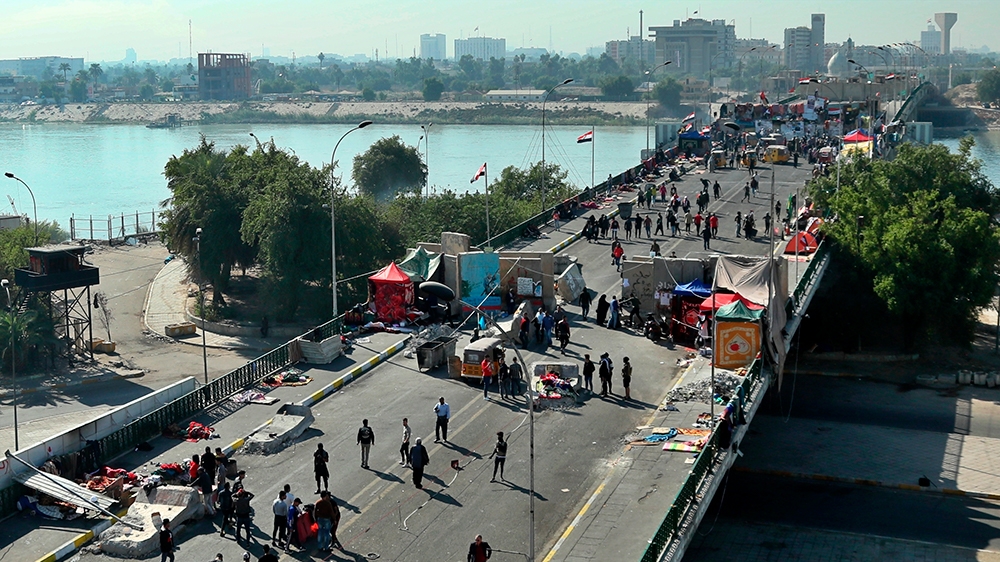
The bridges have hosted fierce street battles between protesters, who are demanding an end to corruption and better economic opportunities and public services, and Iraqi security forces, who have used tear gas and live ammunition to quell the demonstrations.
The repeated clashes and disorder in the capital have forced most stores in the Sinak market to shutter for extended periods, leaving business owners struggling to make ends meet.
“We had to close our doors for 25 days because of the clashes, tear gas and gunfire near the bridge,” said Ammar, who owns a hardware store.
“Some of the nearby shops were even torched and robbed by mobs,” the 36-year-old said.
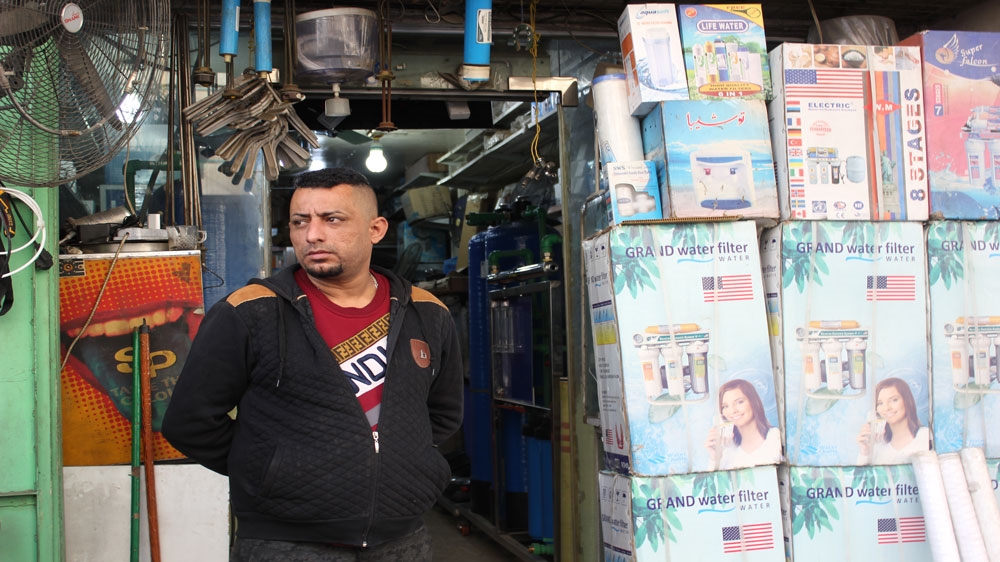
“We reopened a few days ago but there have barely been any customers because the roads to the market were closed off and people were afraid to come,” he said, adding that his daily income had been slashed. “I used to make 200,000-300,000 dinars [$167-$251] a day. Now, if I make 25,000 [$21] it’s considered a good one.”
More than 330 people have been killed and 15,000 others wounded since the demonstrations erupted across the country on October 1. Yet there is no sign of the protests subsiding, as those on the streets continue to call for the removal of the government, an end to foreign meddling in the country’s affairs and a complete overhaul of the country’s political system, where power is shared between religious and ethnic groups.
The protests in the capital also forced Abbas, 49, to close his shop but it has since reopened.
“On weekends, our shop was always bustling with customers from across Iraq, but now it’s only a few people here and there. Near nothing is being sold,” Abbas told Al Jazeera. “We don’t really have an alternative but to remain patient. We take things day-by-day and live on whatever comes into the shop.”
Yet, despite the financial losses, Abbas said he backed the protest movement.
“Even if the demonstrations are impacting our incomes and businesses, we are completely supportive of the anti-government protest movement and what it is trying to achieve,” Abbas told Al Jazeera.
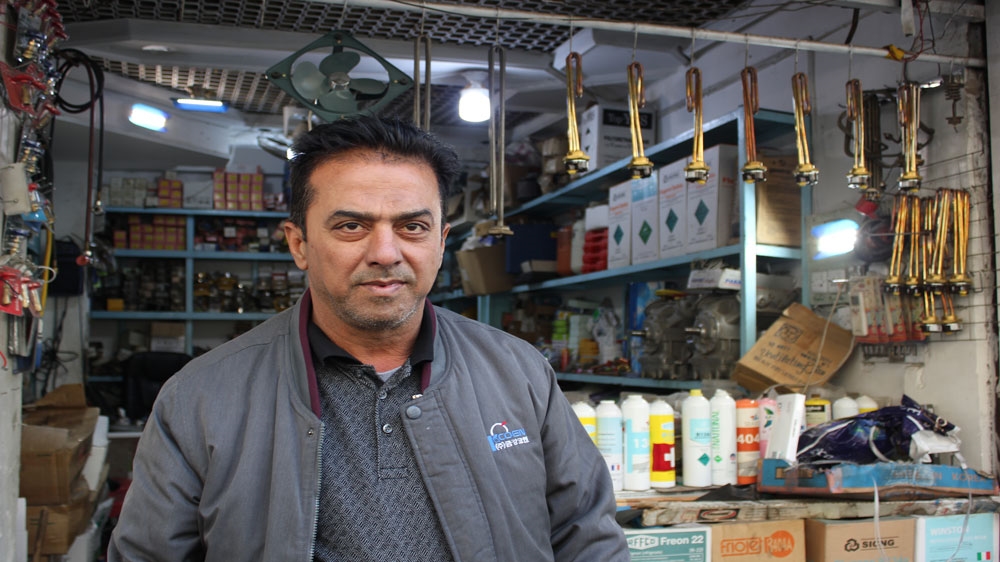
Dipping into savings
At Shorja market, Baghdad’s main wholesale and commercial centre, shop owners said that their incomes have also been severely impacted since the protests erupted.
“We’re further away from the heart of the protests but the whole of central Baghdad has been impacted by the demonstrations,” said Muqtada, 20, who works at his father’s lighting fixtures shop in Shorja market.
“As small business owners, we depend on a daily income, so without that, we’re having to dip into our savings. There simply isn’t enough coming in,” he added.
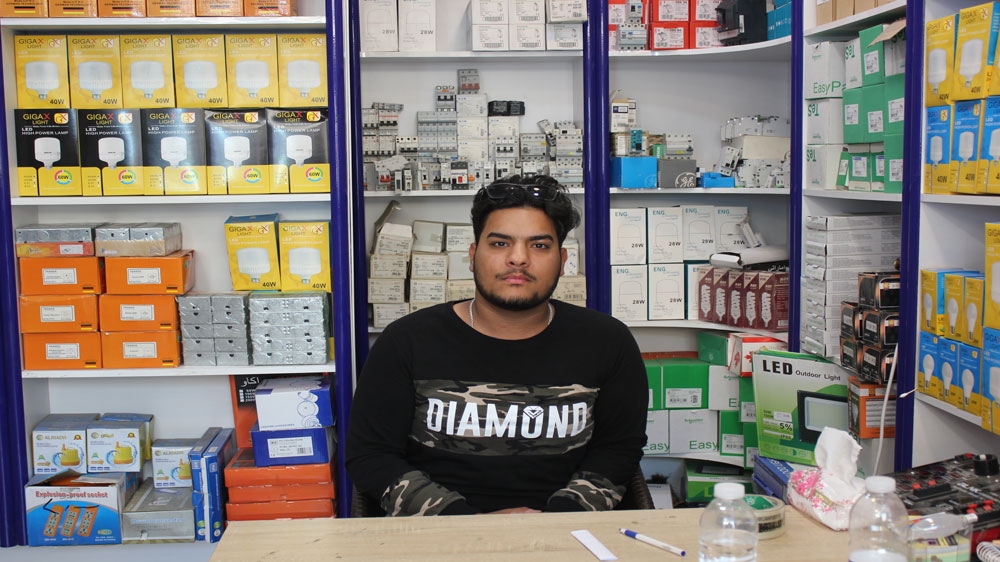
According to Muqtada, the family shop brought in a million Iraqi dinars on a typical Friday, but now it barely makes 150,000 dinars ($126) worth of sales. However, he said he would accept further financial difficulties if the protests movement led to positive political change.
“Even if these demonstrations carry on for months and months, these losses are but a small price to pay for a better future in Iraq.”
Port closures
Mohammed Hanoun, spokesman for the ministry of trade, says that while businesses located near Tahrir Square, the main protest site in the capital, have endured huge losses as a result of the political crisis, official statistics on financial impact were not available.
According to Hanoun the “main source of the economic losses in Iraq has to do with the blockage of roads leading to oilfields and the country’s main port,” Umm Qasr, located in southern Iraq.
Earlier this month, sources told Reuters News Agency that anti-government protesters caused fuel shortages across Dhi Qar province after they blocked tankers, used to transport fuel to petrol stations, from entering Nasiriya oil refinery.
Separately, following weeks of on-and-off closures, Iraqi security forces reopened the entrance to the country’s main Umm Qasr port near Basra on Friday, after protesters had blocked it for four days, officials told Reuters.
Umm Qasr, which receives grain, oils and sugar shipments that feed a country largely dependent on imported food items, was previously blocked twice in October and November, with a brief resumption of operations between November 7-9. Official estimates put losses during the first week of the closure at $6bn.
Food imports
According to Iraqi economic analyst Manaf al-Moussawi, if protesters go back to blocking the main ports, certain imported food items including flour and fruits and vegetables could eventually become scarce and more expensive in Iraq.”Although no products have disappeared from the Iraqi market so far, there is definitely a worry that certain food items will soon become more expensive,” he added.
Mohamed Ali, who owns a supermarket in Shorja market, said all food products are available at his shop and he has not had to raise his prices.
“The products we sell are still coming through and our prices are the same. But people aren’t buying as much and that’s worrying,” the 65-year-old told Al Jazeera.